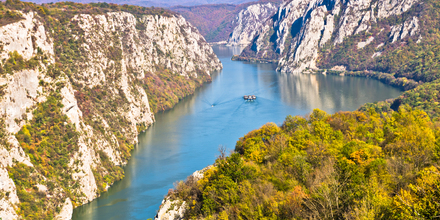Green Economy
Our Work
Latest in Green Economy
-

Natura 2000 and Jobs – Scoping the Evidence
The European Natura 2000 network provides job opportunities in sectors ranging from conservation and restoration, agriculture, forestry, fisheries to tourism, recreation, and health.
-
Access to Nature Reduces Health Inequalities: An IEEP Briefing
Improving access to nature can help address health and social challenges across Europe and reduce health inequalities.
-
How can Planetary Boundaries guide environmental policy in Europe and globally?
Planetary Boundaries are a scientific approach to exploring critical thresholds to resource use. How can this concept become relevant for policymakers?
-
Greening taxes and subsidies in the Pacific
IEEP will share its expertise on environmental taxation and the reform of environmentally harmful subsidies at a forum event on greening taxation and subsidies in the Pacific region during the IUCN World Conservation Congress in Hawaii.
-
Wildlife crime and the EU
Wildlife crime threatens global biodiversity. The EU is both a destination and a transit region for illegally-traded products. A new study for the European Parliament summarises the situation in Europe and offers policy recommendations in view of the upcoming EU Action Plan. A set of in-depth case studies outline the situation in five EU countries.
-
Beyond GDP Newsletter – March 2016 edition out now
The March 2016 Beyond GDP newsletter sheds light on the creation of indicators for the Sustainable Development Goals and relates this process to the Europe 2020 and EU Sustainable Development Strategies.
-
Beyond GDP Newsletter – March 2015 edition out now
The latest edition of the Beyond GDP newsletter looks closely at the Inclusive Wealth Index (IWI) 2014 and discusses the challenges of developing sustainability indices.How might a ...
-
IEEP supporting the cross-Atlantic dialogue on Northern sustainable development
An International Symposium on Northern development took place in Québec City from the 25 - 27 February 2015. IEEP’s Marianne Kettunen was one of the Nordic experts invited to present at the event and take part in the high-level discussions.
-
The Manual: Chapter 1 - Policy framework
This is a chapter of IEEP’s Manual of European Environmental Policy. In this chapter, the reader is introduced to European environmental policy, EU institutions and agencies, and the development of EU treaties.
-
The Manual: Chapter 7 - Resource use
This is a chapter of IEEP’s Manual of European Environmental Policy. This is a chapter of IEEP’s Manual of European Environmental Policy. This chapter illustrates the variety of EU laws, policies and guidance documents that have been adopted to improve the efficiency of our use of natural resources and to reduce environmental impacts throughout a product's life cycle.
-
Policy mixes addressing natural resources: learning from real world experiences
This report synthesizes the assessment of policy-mixes in different sectors. It identifes the factors characterising effective policy-mixes and some of the most frequent shortcomings in policy-mix design.
-
On the path to a circular economy
Read the lastest edition of our newsletter for our views on the circular economy package and much more.
-
Environmental Tax Reform in Europe: Opportunities for the future
A new study by IEEP assesses the current state of play with environmental taxes in Europe, explores where further greening taxation could be appropriate and how to drive this agenda forward through ‘coalitions of like-minded countries’.
-
New book out now! Paying the Polluter - Environmentally Harmful Subsidies and their Reform
This new book edited by F. Oosterhuis (IVM) and P. ten Brink (IEEP) provides insights on the scale and impact of environmentally harmful subsidies (EHS), the importance of reforming such subsidies, examples of successful reform and their benefits, lessons learned and tools to support reform efforts.
-
Sectoral resource mobilisation to implement global biodiversity targets
There is an urgent need to find sufficient resources to enable developing countries to implement the global targets for biodiversity by 2020. Financing the conservation and sustainable use of biodiversity from different sectoral funding flows can complement global biodiversity financing.
-
Ecosystem services of boreal mires and peatlands in Finland
Mire ecosystems are well-known for their unique species and habitats of high conservation value and they also provide a range of benefits to our societies and economies. This publication outlines the results of a pioneering project that aimed to identify and valuate ecosystem services provided by pristine mires and managed peatlands in Finland.
-
Incorporating biodiversity and ecosystem service values into national strategies and action plans
This guidance document has been prepared to support practitioners of National Biodiversity Strategies and Action Plans to update their plans to incorporate biodiversity and ecosystem service values. Six in depth country case studies provide common lessons of good practice.
-
Webinar: Incorporating biodiversity into national strategies and action plans
IEEP has just produced a roadmap and guidance document to help practitioners to incorporate biodiversity and ecosystem values into their NBSAPs. See case study examples and tune into the webinars on June 5 and 7.
-
New report: The Economics of Ecosystems and Biodiversity for Water and Wetlands
This new IEEP-led report presents insights on the importance of wetlands in delivering ecosystem services that are needed to support human life, and also for people’s livelihoods and the world’s economies. The report shows that demonstrating and using the values of ecosystem services related to water and wetlands can lead to better informed, more cost-effective, and fairer decision- making.
-
The Economics of Ecosystems and Biodiversity for Water and Wetlands
This new IEEP-led report presents insights on the importance of wetlands in delivering ecosystem services that are needed to support human life, and also for people’s livelihoods and the world’s economies. The report shows that demonstrating and using the values of ecosystem services related to water and wetlands can lead to better informed, more cost-effective, and fairer decision- making.
Highlights
-

Access to Nature Reduces Health Inequalities: An IEEP Briefing
Improving access to nature can help address health and social challenges across Europe and reduce health inequalities.
-

Wildlife crime and the EU
Wildlife crime threatens global biodiversity. The EU is both a destination and a transit region for illegally-traded products. A new study for the European Parliament summarises the situation in Europe and offers policy recommendations in view of the upcoming EU Action Plan. A set of in-depth case studies outline the situation in five EU countries.
-

Sectoral resource mobilisation to implement global biodiversity targets
